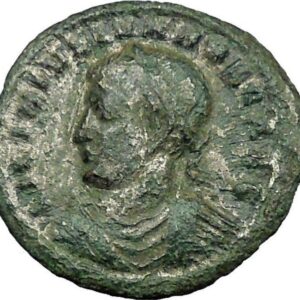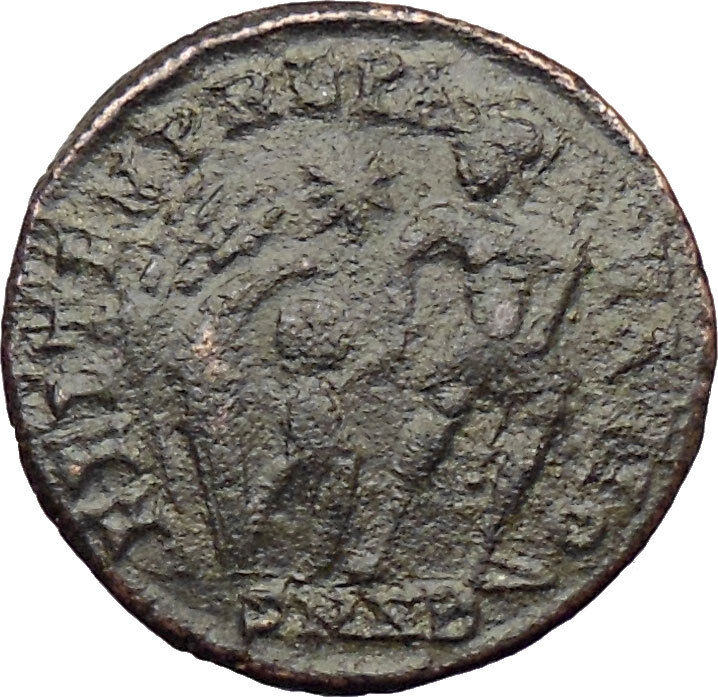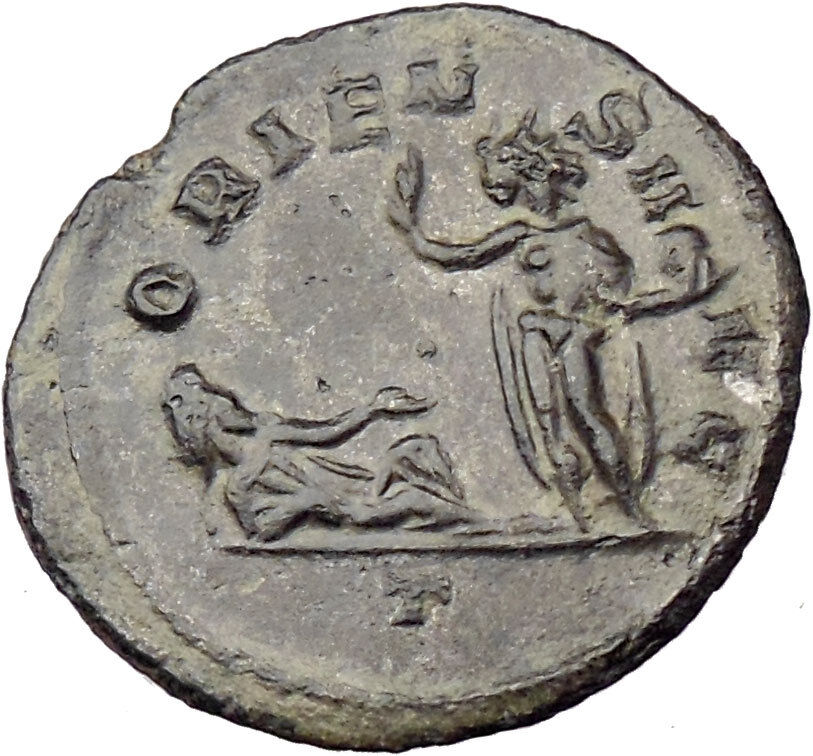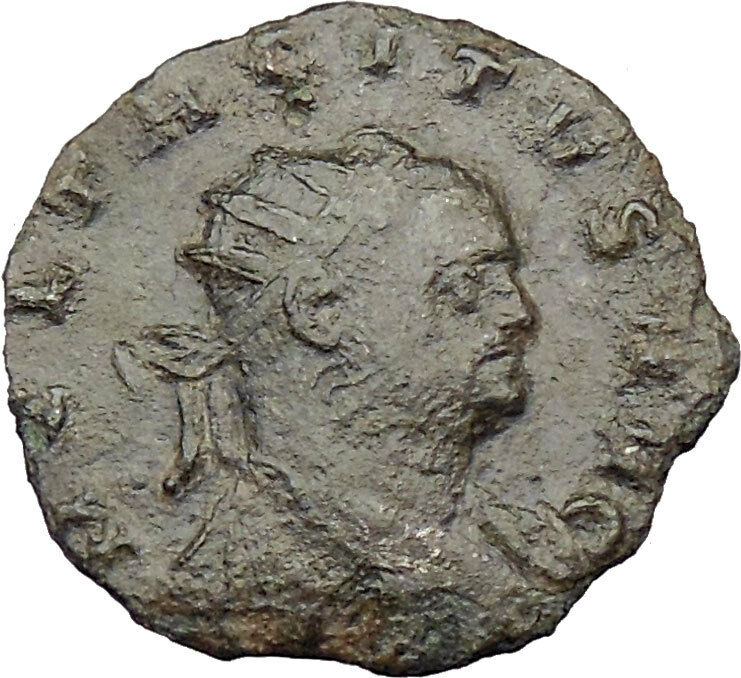|
Marcus Aurelius & Lucius Verus
Mark Antony Restoration issue of Mark Antony legionary type. Struck to commemorate the 200th anniversary of the battle of Actium.
Silver Denarius 17mm (3.04 grams) Struck 165-169 A.D. under Marcus Aurelius & Lucius Verus
Reference: RIC III 443 (Aurelius and Verus); MIR 18, 120-4 (Aurelius); RSC 83.
Certification: NGC Ancients VG 4375823-148
ANTONINVS . AVGVR III . VIR . R . P . C ., Praetorian galley right.
LEG VI, legionary aquila between two signa, ANTONINVS ET VERVS AVG . REST around.
You are bidding on the exact item pictured, provided with a Certificate of Authenticity and Lifetime Guarantee of Authenticity.
 Marcus Antonius, commonly known in English as Mark Antony (Latin: M·ANTONIVS·M·F·M·N)(January 14, 83 BC – August 1, 30 BC), was a Roman politician and general. As a military commander and administrator, he was an important supporter and loyal friend of his mother’s cousin Julius Caesar. After Caesar’s assassination, Antony formed an official political alliance with Octavian (the future Augustus) and Lepidus, known to historians today as the Second Triumvirate. Marcus Antonius, commonly known in English as Mark Antony (Latin: M·ANTONIVS·M·F·M·N)(January 14, 83 BC – August 1, 30 BC), was a Roman politician and general. As a military commander and administrator, he was an important supporter and loyal friend of his mother’s cousin Julius Caesar. After Caesar’s assassination, Antony formed an official political alliance with Octavian (the future Augustus) and Lepidus, known to historians today as the Second Triumvirate.
The triumvirate broke up in 33 BC. Disagreement between Octavian and Antony erupted into civil war, the Final War of the Roman Republic, in 31 BC. Antony was defeated by Octavian at the naval Battle of Actium, and in a brief land battle at Alexandria. He and his lover Cleopatra committed suicide shortly thereafter. His career and defeat are significant in Rome’s transformation from Republic to Empire.
Early life
A member of the Antonia clan (gens), Antony was born on January 14, mostly likely in 83 BC. Plutarch gives Antony’s year of birth as either 86 or 83 BC. Antony was an infant at the time of Sulla’s landing at Brundisium in the spring of 83 BC and the subsequent proscriptions that had put the life of the teen-aged Julius Caesar at risk. He was the homonymous and thus presumably the eldest son of Marcus Antonius Creticus (praetor 74 BC, proconsul 73-71 BC) and grandson of the noted orator Marcus Antonius (consul 99 BC, censor 97-6 BC) who had been murdered during the Marian Terror of the winter of 87-6 BC.
Antony’s father was incompetent and corrupt, and according to Cicero, he was only given power because he was incapable of using or abusing it effectively. In 74 BC he was given imperium infinitum to defeat the pirates of the Mediterranean, but he died in Crete in 71 BC without making any significant progress. Creticus had two other sons: Gaius (praetor 44 BC, born c.82 BC) and Lucius (quaestor 50 BC, consul 41 BC, born c.81 BC).
Antony’s mother, Julia, was a daughter of Lucius Caesar (consul 90 BC, censor 89 BC). Upon the death of her first husband, she married Publius Cornelius Lentulus (consul 71 BC), an eminent patrician. Lentulus, despite exploiting his political success for financial gain, was constantly in debt due to the extravagance of his lifestyle. He was a major figure in the Second Catilinarian Conspiracy and was extrajudicially killed on the orders of Cicero in 63 BC.
Antony lived a dissipate lifestyle as a youth, and gained a reputation for heavy gambling. According to Cicero, he had a homosexual relationship with Gaius Scribonius Curio. There is little reliable information on his political activity as a young man, although it is known that he was an associate of Clodius. He may also have been involved in the Lupercal cult, as he was referred to as a priest of this order later in life.
In 58 BC, Antony travelled to Athens to study rhetoric and philosophy, escaping his creditors. The next year, he was summoned by Aulus Gabinius, proconsul of Syria, to take part in the campaigns against Aristobulus II in Judea, as the commander of a Gallic cavalry regiment. Antony achieved important victories at Alexandrium and Machaerus.
Supporter of Caesar
In 54 BC, Antony became a staff officer in Caesar’s armies in Gaul and Germany. He again proved to be a competent military leader in the Gallic Wars. Antony and Caesar were the best of friends, as well as being fairly close relatives. Antony made himself ever available to assist Caesar in carrying out his military campaigns.
Raised by Caesar’s influence to the offices of quaestor, augur, and tribune of the plebeians (50 BC), he supported the cause of his patron with great energy. Caesar’s two proconsular commands, during a period of ten years, were expiring in 50 BC, and he wanted to return to Rome for the consular elections. But resistance from the conservative faction of the Roman Senate, led by Pompey, demanded that Caesar resign his proconsulship and the command of his armies before being allowed to seek re-election to the consulship.
This Caesar would not do, as such an act would at least temporarily render him a private citizen and thereby leave him open to prosecution for his acts while proconsul. It would also place him at the mercy of Pompey’s armies. To prevent this occurrence Caesar bribed the plebeian tribune Curio to use his veto to prevent a senatorial decree which would deprive Caesar of his armies and provincial command, and then made sure Antony was elected tribune for the next term of office.
Antony exercised his tribunician veto, with the aim of preventing a senatorial decree declaring martial law against the veto, and was violently expelled from the senate with another Caesar adherent, Cassius, who was also a tribune of the plebs. Caesar crossed the river Rubicon upon hearing of these affairs which began the Republican civil war. Antony left Rome and joined Caesar and his armies at Ariminium, where he was presented to Caesar’s soldiers still bloody and bruised as an example of the illegalities that his political opponents were perpetrating, and as a casus belli.
Tribunes of the Plebs were meant to be untouchable and their veto inalienable according to the Roman mos maiorum (although there was a grey line as to what extent this existed in the declaration of and during martial law). Antony commanded Italy whilst Caesar destroyed Pompey’s legions in Spain, and led the reinforcements to Greece, before commanding the right wing of Caesar’s armies at Pharsalus.
Administrator of Italy
When Caesar became dictator for a second time, Antony was made magister equitum, and in this capacity he remained in Italy as the peninsula’s administrator in 47 BC, while Caesar was fighting the last Pompeians, who had taken refuge in the province of Africa. But Antony’s skills as an administrator were a poor match for his generalship, and he seized the opportunity of indulging in the most extravagant excesses, depicted by Cicero in the Philippics. In 46 BC he seems to have taken offense because Caesar insisted on payment for the property of Pompey which Antony professedly had purchased, but had in fact simply appropriated.
Conflict soon arose, and, as on other occasions, Antony resorted to violence. Hundreds of citizens were killed and Rome itself descended into a state of anarchy. Caesar was most displeased with the whole affair and removed Antony from all political responsibilities. The two men did not see each other for two years. The estrangement was not of long continuance, with Antony meeting the dictator at Narbo (45 BC) and rejecting the suggestion of Trebonius that he should join in the conspiracy that was already afoot. Reconciliation arrived in 44 BC, when Antony was chosen as partner for Caesar’s fifth consulship.
Whatever conflicts existed between the two men, Antony remained faithful to Caesar but it is worth mentioning that according to Plutarch (paragraph 13) Trebonius, one of the conspirators, had ‘sounded him unobtrusively and cautiously…Antony had understood his drift…but had given him no encouragement: at the same time he had not reported the conversation to Caesar’. On February 15, 44 BC, during the Lupercalia festival, Antony publicly offered Caesar a diadem. This was an event fraught with meaning: a diadem was a symbol of a king, and in refusing it, Caesar demonstrated that he did not intend to assume the throne.
Casca, Marcus Junius Brutus and Cassius decided, in the night before the Assassination of Julius Caesar, that Mark Antony should stay alive. The following day, the Ides of March, he went down to warn the dictator but the Liberatores reached Caesar first and he was assassinated on March 15, 44 BC. In the turmoil that surrounded the event, Antony escaped Rome dressed as a slave; fearing that the dictator’s assassination would be the start of a bloodbath among his supporters. When this did not occur, he soon returned to Rome, discussing a truce with the assassins’ faction. For a while, Antony, as consul, seemed to pursue peace and an end to the political tension. Following a speech by Cicero in the Senate, an amnesty was agreed for the assassins.
Caesar’s assassination caused widespread discontent among the Roman middle and lower classes with whom Caesar was popular. The mob grew violent at Caesar’s funeral and attacked the homes of Brutus and Cassius. Antony, Octavian and Lepidus, capitalised on the mood of the plebians and incited them against the Optimates. Tension escalated and finally spiraled out of control resulting in the Liberators’ civil war
Enemy of the state and triumvirate
Roman aureus bearing the portraits of Mark Antony (left) and Octavian (right). Struck in 41 BC, this coin was issued to celebrate the establishment of the Second Triumvirate by Octavian, Antony and Marcus Lepidus in 43 BC. Both sides bear the inscription “III VIR R P C”, meaning “One of Three Men for the Regulation of the Republic”.
Antony, left as sole Consul, surrounded himself with a bodyguard of Caesar’s veterans and forced the senate to transfer to him the province of Cisalpine Gaul, which was then administered by Decimus Junius Brutus Albinus, one of the conspirators. Brutus refused to surrender the province and Antony set out to attack him in the beginning of 43 BC, besieging him at Mutina.
Encouraged by Cicero, the Senate denounced Antony and in January 43 they granted Octavian imperium (commanding power), which made his command of troops legal and sent him to relieve the siege, along with Aulus Hirtius and Gaius Vibius Pansa Caetronianus, the consuls for 43 BC. In April 43, Antony’s forces were defeated at the Battles of Forum Gallorum and Mutina, forcing Antony to retreat to Transalpine Gaul. However, both consuls were killed, leaving Octavian in sole command of their armies.
When they knew that Caesar’s assassins, Brutus and Cassius, were assembling an army in order to march on Rome, Antony, Octavian and Lepidus allied in November 43 BC, forming the Second Triumvirate to stop them. Brutus and Cassius were defeated by Antony and Octavian at the Battle of Philippi in October 42 BC. After the battle, a new arrangement was made among the members of the Second Triumvirate: while Octavian returned to Rome, Antony went on to govern the east. Lepidus went on to govern Hispania and the province of Africa. The triumvirate’s enemies were subjected to proscription including Mark Antony’s archenemy Cicero who was killed on December 7, 43 BC.
Antony and Cleopatra
Antony summoned Cleopatra to Tarsus in October 41 BC. There they formed an alliance and became lovers. Antony returned to Alexandria with her, where he spent the winter of 41 BC – 40 BC. In spring 40 BC he was forced to return to Rome following news of his wife Fulvia’s involvement in civil strife with Octavian on his behalf. Fulvia died while Antony was en route to Sicyon (where Fulvia was exiled). Antony made peace with Octavian in September 40 BC and married Octavian’s sister Octavia Minor.
The Parthian Empire had supported Brutus and Cassius in the civil war, sending forces which fought with them at Philippi; following Antony and Octavian’s victory, the Parthians invaded Roman territory, occupying Syria, advancing into Asia Minor and installing Antigonus as puppet king in Judaea to replace the pro-Roman Hyrcanus. Antony sent his general Ventidius to oppose this invasion. Ventidius won a series of victories against the Parthians, killing the crown prince Pacorus and expelling them from the former Roman territories which they had seized.
Antony now planned to retaliate by invading Parthia, and secured an agreement from Octavian to supply him with extra troops for his campaign. With this military purpose on his mind, Antony sailed to Greece with Octavia, where he behaved in a most extravagant manner, assuming the attributes of the Greek god Dionysus in 39 BC. But the rebellion in Sicily of Sextus Pompeius, the last of the Pompeians, kept the army promised to Antony in Italy. With his plans again disrupted, Antony and Octavian quarreled once more. This time with the help of Octavia, a new treaty was signed in Tarentum in 38 BC. The triumvirate was renewed for a period of another five years (ending in 33 BC) and Octavian promised again to send legions to the East.
But by now, Antony was skeptical of Octavian’s true support of his Parthian cause. Leaving Octavia pregnant with her second child Antonia in Rome, he sailed to Alexandria, where he expected funding from Cleopatra, the mother of his twins. The queen of Egypt lent him the money he needed for the army, and after capturing Jerusalem and surrounding areas in 37 BC, he installed Herod as puppet king of Judaea, replacing the Parthian appointee Antigonus.
Antony then invaded Parthian territory with an army of about 100,000 Roman and allied troops but the campaign proved a disaster. After defeats in battle, the desertion of his Armenian allies and his failure to capture Parthian strongholds convinced Antony to retreat, his army was further depleted by the hardships of its retreat through Armenia in the depths of winter, losing more than a quarter of its strength in the course of the campaign.
Meanwhile, in Rome, the triumvirate was no more. Octavian forced Lepidus to resign after the older triumvir attempted an ill-judged political move. Now in sole power, Octavian was occupied in wooing the traditional Republican aristocracy to his side. He married Livia and started to attack Antony in order to raise himself to power. He argued that Antony was a man of low morals to have left his faithful wife abandoned in Rome with the children to be with the promiscuous queen of Egypt. Antony was accused of everything, but most of all, of “going native”, an unforgivable crime to the proud Romans. Several times Antony was summoned to Rome, but remained in Alexandria with Cleopatra.
Again with Egyptian money, Antony invaded Armenia, this time successfully. In the return, a mock Roman Triumph was celebrated in the streets of Alexandria. The parade through the city was a pastiche of Rome’s most important military celebration. For the finale, the whole city was summoned to hear a very important political statement. Surrounded by Cleopatra and her children, Antony ended his alliance with Octavian.
He distributed kingdoms among his children: Alexander Helios was named king of Armenia, Media and Parthia (territories which were not for the most part under the control of Rome), his twin Selene got Cyrenaica and Libya, and the young Ptolemy Philadelphus was awarded Syria and Cilicia. As for Cleopatra, she was proclaimed Queen of Kings and Queen of Egypt, to rule with Caesarion (Ptolemy XV Caesar, son of Cleopatra by Julius Caesar), King of Kings and King of Egypt. Most important of all, Caesarion was declared legitimate son and heir of Caesar. These proclamations were known as the Donations of Alexandria and caused a fatal breach in Antony’s relations with Rome.
While the distribution of nations among Cleopatra’s children was hardly a conciliatory gesture, it did not pose an immediate threat to Octavian’s political position. Far more dangerous was the acknowledgment of Caesarion as legitimate and heir to Caesar’s name. Octavian’s base of power was his link with Caesar through adoption, which granted him much-needed popularity and loyalty of the legions. To see this convenient situation attacked by a child borne by the richest woman in the world was something Octavian could not accept. The triumvirate expired on the last day of 33 BC and was not renewed. Another civil war was beginning.
During 33 and 32 BC, a propaganda war was fought in the political arena of Rome, with accusations flying between sides. Antony (in Egypt) divorced Octavia and accused Octavian of being a social upstart, of usurping power, and of forging the adoption papers by Caesar. Octavian responded with treason charges: of illegally keeping provinces that should be given to other men by lots, as was Rome’s tradition, and of starting wars against foreign nations (Armenia and Parthia) without the consent of the Senate.
Antony was also held responsible for Sextus Pompeius’ execution with no trial. In 32 BC, the Senate deprived him of his powers and declared war against Cleopatra – not Antony, because Octavian had no wish to advertise his role in perpetuating Rome’s internecine bloodshed. Both consuls, Gnaeus Domitius Ahenobarbus and Gaius Sosius, and a third of the Senate abandoned Rome to meet Antony and Cleopatra in Greece.
In 31 BC, the war started. Octavian’s loyal and talented general Marcus Vipsanius Agrippa captured the Greek city and naval port of Methone, loyal to Antony. The enormous popularity of Octavian with the legions secured the defection of the provinces of Cyrenaica and Greece to his side. On September 2, the naval battle of Actium took place. Antony and Cleopatra’s navy was destroyed, and they were forced to escape to Egypt with 60 ships.
Octavian, now close to absolute power, did not intend to give them rest. In August 30 BC, assisted by Agrippa, he invaded Egypt. With no other refuge to escape to, Antony committed suicide by stabbing himself with his sword in the mistaken belief that Cleopatra had already done so. When he found out that Cleopatra was still alive, his friends brought him to Cleopatra’s monument in which she was hiding, and he died in her arms.
Cleopatra was allowed to conduct Antony’s burial rites after she had been captured by Octavian. Realising that she was destined for Octavian’s triumph in Rome, she made several attempts to take her life and was finally successful in mid-August. Octavian had Caesarion murdered, but he spared Antony’s children by Cleopatra, who were paraded through the streets of Rome. Antony’s daughters by Octavia were spared, as was his son, Iullus Antonius. But his elder son, Marcus Antonius Antyllus, was killed by Octavian’s men while pleading for his life in the Caesareum.
Aftermath and legacy
Cicero’s son, Cicero Minor, announced Antony’s death to the senate. Antony’s honours were revoked and his statues removed (damnatio memoriae). Cicero also made a decree that no member of the Antonii would ever bear the name Marcus again. “In this way Heaven entrusted the family of Cicero the final acts in the punishment of Antony.”
When Antony died, Octavian became uncontested ruler of Rome. In the following years, Octavian, who was known as Augustus after 27 BC, managed to accumulate in his person all administrative, political, and military offices. When Augustus died in 14 AD, his political powers passed to his adopted son Tiberius; the Roman Principate had begun.
The rise of Caesar and the subsequent civil war between his two most powerful adherents effectively ended the credibility of the Roman oligarchy as a governing power and ensured that all future power struggles would centre upon which one individual would achieve supreme control of the government, eliminating the Senate and the former magisterial structure as important foci of power, in these conflicts. Thus, in history, Antony appears as one of Caesar’s main adherents, he and Octavian Augustus being the two men around whom power coalesced following the assassination of Caesar, and finally as one of the three men chiefly responsible for the demise of the Roman Republic.
Through his youngest daughters, Antony would become ancestor to most of the Julio-Claudian dynasty, the very family which as represented by Octavian Augustus that he had fought unsuccessfully to defeat. Through his eldest daughter, he would become ancestor to the long line of kings and co-rulers of the Bosporan Kingdom, the longest-living Roman client kingdom, as well as the rulers and royalty of several other Roman client states. Through his daughter by Cleopatra, Antony would become ancestor to the royal family of Mauretania, another Roman client kingdom, while through his sole surviving son Iullus, he would be ancestor to several famous Roman statesmen.
|








 Marcus Antonius, commonly known in English as Mark Antony (Latin: M·ANTONIVS·M·F·M·N)(January 14, 83 BC – August 1, 30 BC), was a Roman politician and general. As a military commander and administrator, he was an important supporter and loyal friend of his mother’s cousin Julius Caesar. After Caesar’s assassination, Antony formed an official political alliance with Octavian (the future Augustus) and Lepidus, known to historians today as the Second Triumvirate.
Marcus Antonius, commonly known in English as Mark Antony (Latin: M·ANTONIVS·M·F·M·N)(January 14, 83 BC – August 1, 30 BC), was a Roman politician and general. As a military commander and administrator, he was an important supporter and loyal friend of his mother’s cousin Julius Caesar. After Caesar’s assassination, Antony formed an official political alliance with Octavian (the future Augustus) and Lepidus, known to historians today as the Second Triumvirate.




